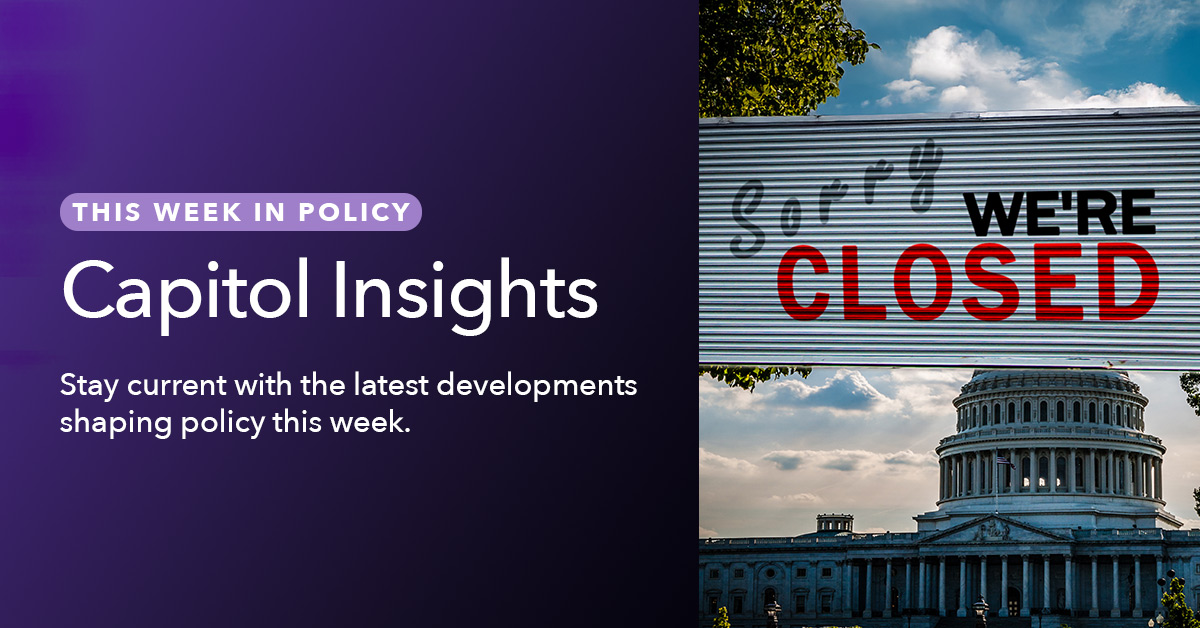Capitol Insights: Government Shutdown Puts WOTC in Focus

Capitol Insights delivers weekly updates on federal policy developments in Washington, spotlighting issues that directly impact the Work Opportunity Tax Credit (WOTC). We focus on distilling key takeaways most relevant to employers.
Last Week’s Update
In last week’s Insight, we examined the looming FY 2026 funding deadline and how partisan gridlock raised the risk of a government shutdown. Read Week 3 here .
At a Glance:
-
Federal government officially shut down on October 1 after Congress failed to reach a funding deal.
-
Democrats are holding out for an extension of ACA premium credits in negotiations.
-
Reports warn nearly 6M Americans could lose coverage if credits expire.
-
New bipartisan WOTC bill expected soon with five-year extension.
-
Year-end deal may package healthcare credits, WOTC, and tax extenders.
As of October 1, 2025, the federal government is shut down. Lawmakers were unable to reach agreement on a continuing resolution to fund operations into the new fiscal year. The deadlock stems from competing demands: Democrats insist on extending enhanced premium credits under the Affordable Care Act, while Republican leaders remain divided on whether to address the issue now or later in a broader healthcare bill.
Although it is difficult to predict at this time how long the current shutdown of federal government operations will last, it is widely expected to end in a bipartisan deal between Congress and the Administration.
At the center of negotiations is a key Democratic priority: an extension of the enhanced premium healthcare support credits under the Affordable Care Act, which are scheduled to expire at the end of the calendar year. These credits remain the core demand of Democratic negotiators. While Republican leaders in Congress have publicly rejected extending them now, internal discussions among Senate Republicans point to a possible year-end healthcare bill that includes the credits.
Various reports suggest the expiration of the credits could result in almost six million Americans losing healthcare coverage, many of them in Republican-led states. Given that backdrop, there are likely enough Senate Republicans to reach a deal with Democrats before the end of the year. A potential short-term solution may be a temporary “clean” continuing resolution to fund the government into November, with a commitment to include healthcare credits in the year-end package.
WOTC as the Anchor of Tax Extenders
The expectation is that a year-end agreement will also serve as the vehicle for a package of tax extenders, with the Work Opportunity Tax Credit (WOTC) positioned as the anchor.
WOTC’s key Congressional Republican sponsors, Senator Bill Cassidy of Louisiana and Representative Lloyd Smucker of Pennsylvania, are preparing to introduce new legislation extending the WOTC program for five years. This legislation is also expected to include most, if not all, of the WOTC enhancements previously proposed in earlier bills. The main modification will be the five-year extension; earlier legislation did not include an extension because it was introduced when expiration was not imminent.
The Senator's tax staff are currently working with the Joint Committee on Taxation to determine the potential cost of the proposed enhancements plus the five-year extension. Both Senator Cassidy and Representative Smucker remain optimistic about WOTC’s chances before year-end.
Employer Incentives in Focus
This is a challenging political climate, and while optimism exists, securing an extension and improvements to WOTC will require additional effort. Ongoing grassroots advocacy emphasizes broadening the pool of WOTC supporters and cosponsors and reinforcing the program’s importance to members of Congress.
For employers, the message resonates strongly: the need to incentivize hiring of WOTC-eligible employees is especially critical now, as new work requirements take effect for federal public assistance programs and the jobs market shows weaker-than-expected performance.
Maximus TCES continues to closely monitor these developments and provide timely insights for employers preparing for policy changes.
Why Bipartisanship Remains Key
Although Republicans have the procedural ability to pass another budget reconciliation bill this year without Democratic support, narrow House margins and internal disagreements make that path unlikely. The more probable outcome is a bipartisan year-end package, which is where WOTC renewal is expected to be included.
Outlook
As of now, the two sides in the federal spending dispute remain far apart. Yet history shows that once congressional leaders reach agreement, the process of translating those deals into legislative text can move rapidly.
Maximus anticipates that WOTC renewal—and potential enhancements—will move forward as part of the final bipartisan year-end package, alongside healthcare credits and other tax provisions. Employers should prepare for heightened legislative activity in November and December, even as the current shutdown slows day-to-day operations.
Topic:
WOTC
